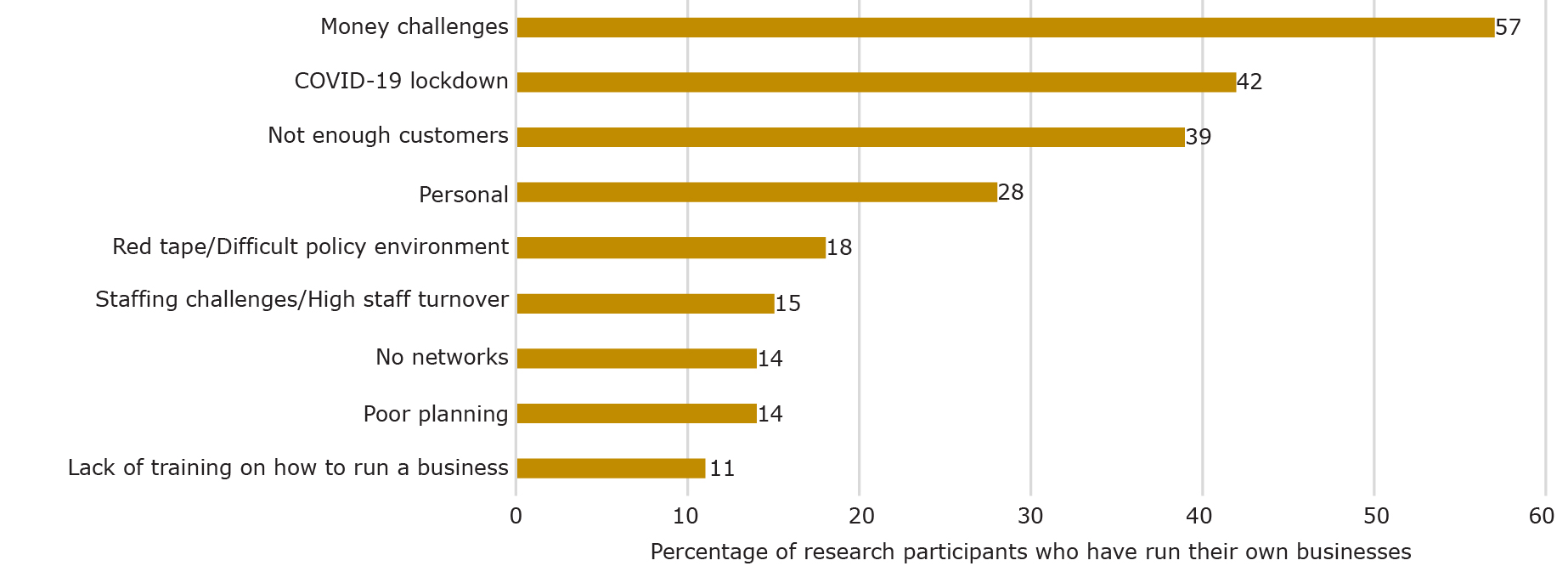In many African countries, young people face a lack of formal employment opportunities. Therefore, they need to explore and assume alternative livelihoods, such as entrepreneurship. Stakeholders and policymakers need to encourage and support these endeavours. An HSRC study provides key insights into what motivates graduate entrepreneurs to forge opportunities and futures for themselves and others. By Jessie-Lee Smith and Vuyiswa Mathambo

Photo by Pexels
Pedro*, a 29-year-old male who participated in an HSRC study, lives in Ghana. While working on his undergraduate degree, which was funded by a scholarship, Pedro started planning a yoghurt business. Today, his business is a success; it has provided a desirable product to local communities and various job opportunities to community members.
Similarly, an e-commerce business started by Relebohile*, a 28-year-old South African graduate, has given owners of small online businesses access to a virtual platform. This platform enables entrepreneurs to better manage their businesses. It allows them to identify market opportunities, reach more clients, analyse business operations, and plan better by anticipating peaks and slumps in sales.
The number of job seekers in South Africa and many other African countries is high, and opportunities for formal employment are becoming increasingly scarce – even for individuals who have completed tertiary education. Yet, the stories of Pedro and Relebohile show how entrepreneurship offers opportunities for young people to innovate and succeed, while also stimulating economies and creating opportunities for others.
Studies have shown that entrepreneurship can substantially contribute to employment opportunities and economic growth in developing countries. Therefore, it is essential to identify pathways that lead young people into entrepreneurship so they can be better supported.
One way in which the HSRC has been doing this is through The Imprint of Education (TIE) study. Following African graduates who were funded by scholarships, this study conducted annual quantitative surveys with 544 scholarship recipients who completed their degrees at selected universities in Ethiopia, Ghana, Kenya, Rwanda, South Africa, Uganda, and at other institutions outside Africa. In 2022, 36% of surveyed participants were running their own entrepreneurial ventures. Additionally, qualitative interviews were conducted with participants from the same universities, with the number of participants ranging from 122 in 2020 to 106 in 2022. Through these interviews, stories like Pedro’s and Relebohile’s have provided researchers with valuable insight into what motivates young entrepreneurs.
Literature has pointed to ‘necessity’ (economic survival) and ‘opportunity’ (gaps in the market) as the primary drivers of youth entrepreneurship. These drivers have become apparent in the entrepreneurial journeys of participants in the TIE study. For example, when Pedro was an undergraduate student, he lived away from home in Ghana’s capital, Accra. During this time, he noticed the frequent consumption of yoghurt-drinks. He recognised their popularity and a market gap in his hometown, where no similar products were being sold. “I realised there are a lot of people who are buying it; people enjoyed the beverage… So, I [thought] if people are enjoying this product over here, there is a higher possibility that back home they are also going to enjoy it,” he told researchers.
However, a significant finding of the TIE study, in line with other studies, is that the factors that encourage young people to start their own businesses are not simply a matter of necessity or opportunity. These factors often overlap, are complex, and can be tied to the desire to benefit others. For example, while recognising the opportunity in the market, Relebohile cited ‘social entrepreneurship’ – a desire to find business solutions to social problems – as an important driver of her entrepreneurship.
Relebohile was motivated by a desire to find solutions to problems rather than by profits alone. She attributed her drive to solve problems to the entrepreneurial training she received at university. “It’s taught me to be… solution-oriented… believing that [I] can actually make a difference… having the power to lead and make changes even on a small scale… So, taking that same mentality and applying it to the world is… a skill that has been useful for me,” she told researchers.
Pedro also exhibited a strong desire to solve problems. He cited that establishing a yoghurt manufacturing company with several distribution channels could lead to the employment of a few of the young people in his community, giving them some form of livelihood.
Pedro and Relebohile’s stories are common among African graduate entrepreneurs. The HSRC team has found that many entrepreneurs started businesses to make a social impact. A noteworthy finding was what a 33-year-old male participant from Kenya referred to as “profit for purpose”. While many entrepreneurs in the study valued the profits, their primary purpose was often to improve the lives of others.
However, despite their desire to make a positive impact in their communities, many young entrepreneurs faced challenges in running and growing their businesses. The most common challenges, mentioned by more than half of the participants operating businesses in 2022, included a lack of capital and cash flow. (Figure 1)
Figure 1. Challenges faced by young entrepreneurs

Source: The Imprint of Education study: Wave 3 data
According to the same study, in 2022, 68% of the interviewed entrepreneurs had started their business using their own savings. Additionally, 25% had accessed seed funding from the scholarship programme. Other funding sources included grants (15%), family and friends (14%), investors and donations (9%), and government loans (7%). A small proportion of participants (6%) reported that they had not required any funding to start their businesses.
Pedro, for instance, attributed his ability and success at starting his yoghurt business to the seed funding provided to scholarship recipients interested in starting entrepreneurial ventures. The wide range of funding sources accessed by participants to start their businesses underscores individual and collective agency, showing that institutions and networks play a pivotal role in nurturing youth entrepreneurship.
The TIE study helped to identify how entrepreneurs can be encouraged and supported to create successful ventures. A presentation at the Next Generation Insights on Intractable National and Global Challenges Research Conference in September 2023 highlighted how stakeholders could be encouraged to do this through financial and training support.
By offering seed funding, grants, or loans, public and private stakeholders can help entrepreneurs launch and scale their ventures. Training programmes at institutions could cover essential skills such as business management, market identification, strategic planning, and effective networking to prepare entrepreneurs for the challenges of the business world. Governments could look into creating enabling environments for upcoming entrepreneurs, ensuring that registration requirements are simple and accessible through online platforms.
While this study captured the stories of a special group of African youth – university graduates funded through scholarships – the stories of successful entrepreneurs like Pedro and Relebohile offer valuable insights and lessons for young people who are contemplating entrepreneurship. In developing countries, the pressing need to diversify income sources further propels entrepreneurial ambitions. This sentiment was echoed by a 31-year-old male participant from Uganda, who remarked, “So, from our upbringing, we are often told… you cannot just rely on your salary… So, from the start, we are taught that you have to do something on the side…”
Many participants cited the desire to make money while helping others as a significant motivation for starting their own businesses, emphasising social entrepreneurship. Lessons gleaned from Pedro and Relobohile’s experiences reflect that social entrepreneurship can be bolstered by academic programmes at secondary and tertiary levels. By cultivating problem-solving mindsets and fostering entrepreneurial skills, students can be equipped to turn societal challenges into business opportunities and catalyse meaningful change in their communities.
Disclaimer: The Imprint of Education (TIE) is conducted by the HSRC in partnership with the Mastercard Foundation. The views expressed do not necessarily represent those of the Foundation, its staff, or its Board of Directors.
*not their real name
Research contact:
Vuyiswa Mathambo, a senior research manager in the HSRC’s Equitable Education and Economics division


